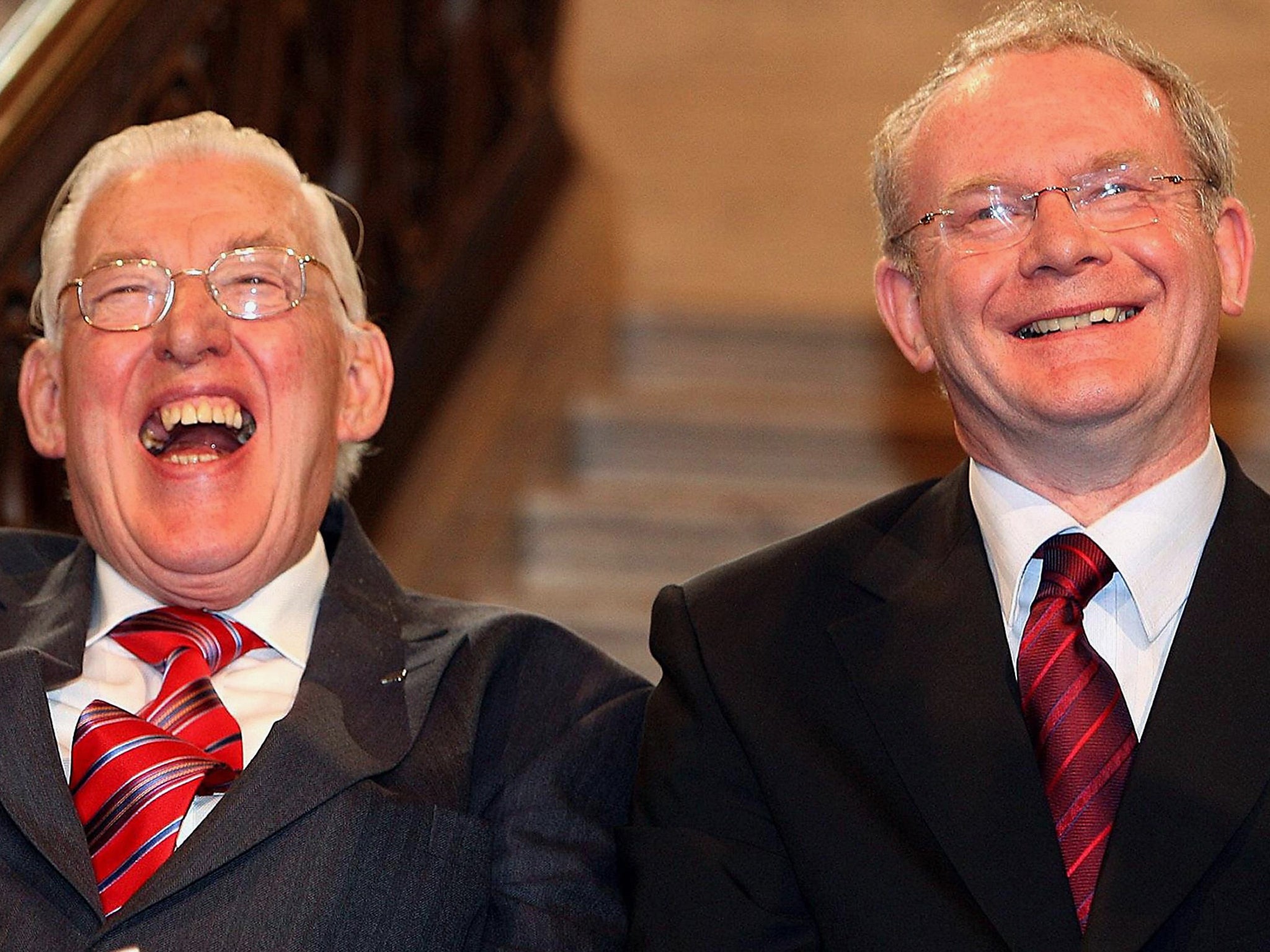I grew up in Belfast as part of the 'peace generation'. The resignation of Martin McGuinness is the end of that era
His unlikely friendship with Ian Paisley became iconic for my generation. If an establishment preacher who once heckled the Pope could develop a true and tender relationship with a former IRA commander, then the rest of us had no excuse for clinging to prejudice and division


Your support helps us to tell the story
From reproductive rights to climate change to Big Tech, The Independent is on the ground when the story is developing. Whether it's investigating the financials of Elon Musk's pro-Trump PAC or producing our latest documentary, 'The A Word', which shines a light on the American women fighting for reproductive rights, we know how important it is to parse out the facts from the messaging.
At such a critical moment in US history, we need reporters on the ground. Your donation allows us to keep sending journalists to speak to both sides of the story.
The Independent is trusted by Americans across the entire political spectrum. And unlike many other quality news outlets, we choose not to lock Americans out of our reporting and analysis with paywalls. We believe quality journalism should be available to everyone, paid for by those who can afford it.
Your support makes all the difference.It came to be one of the most striking and enduring images of the Troubles and subsequent peace process in Northern Ireland. Not a photograph of bloodshed or bombing, but a moment of raucous laughter. Ian Paisley and Martin McGuinness, former sworn enemies turned power-sharing partners, sat side by side in the great foyer at Stormont, heads thrown back in raucous laughter as they shared a joke.
To say theirs was an unlikely friendship would be an understatement verging on farce. In many ways, they both represented what each “side” in Northern Ireland saw as the worst aspects of the other.
Paisley was a staunch Protestant preacher who famously heckled the Pope, calling him the antichrist, while also being an active member of the Ulster protestant establishment in Northern Ireland that suppressed voting rights, employment opportunities and social housing for Catholics. Martin McGuinness, by contrast, was a socialist Republican from the nationalist heartland of Derry, who was a commander in the Provisional IRA. Yet the peace process required that they share power as Northern Irish First Minister and Deputy First Minister respectively. Both swallowed their pride, trauma and convictions to put peace before their personal feelings and ensure The Troubles ended and Stormont could survive.
Their relationship began tense and fraught with the prejudices and rational fears inherent in the bizarre situation of their forced comradeship. But after serving side by side at meetings, on business trips and press calls at Stormont, a sincere and touching friendship organically emerged.
The now famous photo of them in the Stormont foyer, roaring with laughter, earned them the moniker locally “the Chuckle brothers” after the comic duo from children’s TV.
After Paisley’s death in 2014, his former sworn enemy McGuinness was seen fighting back tears as he paid tribute to him. Paisley’s wife Eileen revealed that McGuinness had been a constant source of support during her husband's illness in the months leading to his death, sending thoughtful messages to the couple and words of encouragement. She remarked that the men’s friendship had been “special”, an assessment the Northern Irish public could agree with.
As someone growing up in Belfast in the 1990s, seeing this unlikely friendship develop between the two men became something no less than iconic for my generation. If an establishment preacher who once heckled the Pope could develop a true and tender relationship with a former IRA commander, then the rest of us had no excuse for clinging to prejudice and division.
Their partnership, which began as a gesture and developed into a genuine relationship, embodied the pressing need for links to be forged between the two communities. It required both men to put peace before personal prejudice and embodied the words of local poet Michael Longley when he wrote of the peace process: “I get down on my knees and do what must be done/And kiss Achilles’ hand, the killer of my son.”
Yesterday, McGuinness, now aged 66, confirmed that he is now stepping down from politics. His resignation follows Sinn Fein’s decision to pull out of power-sharing and trigger an election in protest at the Democratic Unionists’ role in a botched government scheme. In recent weeks, he has appeared seriously ill, seeming increasingly frail amid unconfirmed reports he has a serious heart condition. He does not expect to return to front line politics.
McGuinness’s resignation is an end of an era in Northern Ireland’s peace process. It is unknown who will replace him as Deputy First Minister following the 2 March election, as Sinn Fein’s leader Gerry Adams has departed the North for the Southern Irish parliament in Dublin. However, recent weeks have seen the party promote push MLA Michelle O’Neill to the fore, a competent and highly likeable young woman who has no connections to Northern Ireland’s bloody past and focuses on the socialist and social justice aspects of the party’s values.
McGuinness hands the baton of power onto a new generation of politicians committed to continuing his legacy of peace. After a decade at the helm of power-sharing, he leaves Stormont a much better place than when he and Paisley were first forced to strike up awkward conversation. As a member of the “peace generation” in Northern Ireland, McGuinness’s sacrifices were both personal and political, and I am very sorry to see him go.
Join our commenting forum
Join thought-provoking conversations, follow other Independent readers and see their replies
Comments